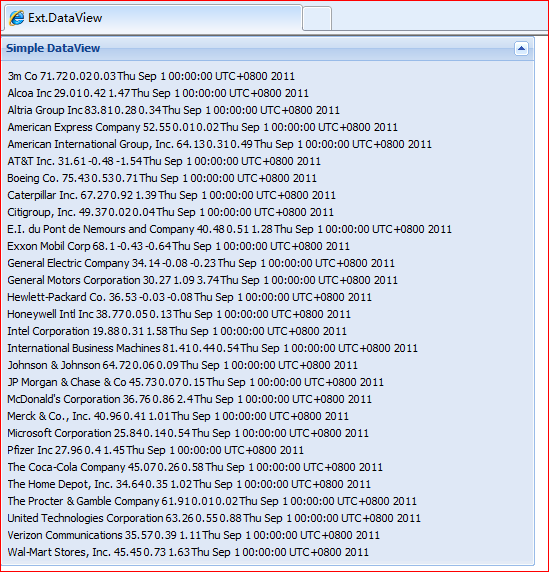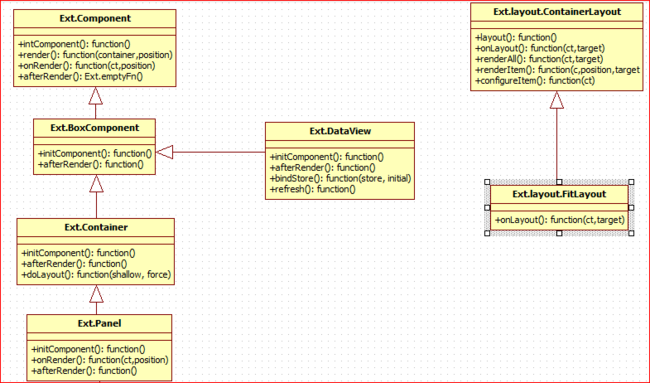分析Ext.DataView结合Ext.Panel是怎么样输出数据
Ext.DataView 一种使用定制的模板布局和格式展示数据的机制。 DataView使用一个Ext.XTemplate作为其内部的模板机制, 并被绑定到一个Ext.data.Store, 这样当store中的数据发生变化时视图将自动同步以反应变化。 视图也内建了对许多可能发生的通用事件的处理,包含项目被单击、双击、鼠标滑过、鼠标移出等等, 同时也有一个内建的选择模型(selection model)。 为了使用这些特性,必须为DataView提供一个itemSelector配置项, 用来决定与哪个节点配合使用。
以下是使用Ext.DataView和Ext.Panel输出数据
<script type="text/javascript">
Ext.onReady(function () {
// create the data store
var store = new Ext.data.ArrayStore({
fields: [
{ name: 'company' },
{ name: 'price', type: 'float' },
{ name: 'change', type: 'float' },
{ name: 'pctChange', type: 'float' },
{ name: 'lastChange', type: 'date', dateFormat: 'n/j h:ia' }
]
});
// sample static data for the store
var myData = [
['3m Co', 71.72, 0.02, 0.03, '9/1 12:00am'],
['Alcoa Inc', 29.01, 0.42, 1.47, '9/1 12:00am'],
['Altria Group Inc', 83.81, 0.28, 0.34, '9/1 12:00am'],
['American Express Company', 52.55, 0.01, 0.02, '9/1 12:00am'],
['American International Group, Inc.', 64.13, 0.31, 0.49, '9/1 12:00am'],
['AT&T Inc.', 31.61, -0.48, -1.54, '9/1 12:00am'],
['Boeing Co.', 75.43, 0.53, 0.71, '9/1 12:00am'],
['Caterpillar Inc.', 67.27, 0.92, 1.39, '9/1 12:00am'],
['Citigroup, Inc.', 49.37, 0.02, 0.04, '9/1 12:00am'],
['E.I. du Pont de Nemours and Company', 40.48, 0.51, 1.28, '9/1 12:00am'],
['Exxon Mobil Corp', 68.1, -0.43, -0.64, '9/1 12:00am'],
['General Electric Company', 34.14, -0.08, -0.23, '9/1 12:00am'],
['General Motors Corporation', 30.27, 1.09, 3.74, '9/1 12:00am'],
['Hewlett-Packard Co.', 36.53, -0.03, -0.08, '9/1 12:00am'],
['Honeywell Intl Inc', 38.77, 0.05, 0.13, '9/1 12:00am'],
['Intel Corporation', 19.88, 0.31, 1.58, '9/1 12:00am'],
['International Business Machines', 81.41, 0.44, 0.54, '9/1 12:00am'],
['Johnson & Johnson', 64.72, 0.06, 0.09, '9/1 12:00am'],
['JP Morgan & Chase & Co', 45.73, 0.07, 0.15, '9/1 12:00am'],
['McDonald\'s Corporation', 36.76, 0.86, 2.40, '9/1 12:00am'],
['Merck & Co., Inc.', 40.96, 0.41, 1.01, '9/1 12:00am'],
['Microsoft Corporation', 25.84, 0.14, 0.54, '9/1 12:00am'],
['Pfizer Inc', 27.96, 0.4, 1.45, '9/1 12:00am'],
['The Coca-Cola Company', 45.07, 0.26, 0.58, '9/1 12:00am'],
['The Home Depot, Inc.', 34.64, 0.35, 1.02, '9/1 12:00am'],
['The Procter & Gamble Company', 61.91, 0.01, 0.02, '9/1 12:00am'],
['United Technologies Corporation', 63.26, 0.55, 0.88, '9/1 12:00am'],
['Verizon Communications', 35.57, 0.39, 1.11, '9/1 12:00am'],
['Wal-Mart Stores, Inc.', 45.45, 0.73, 1.63, '9/1 12:00am']
];
// manually load local data
store.loadData(myData);
var tpl = new Ext.XTemplate('<tpl for=".">',
'<div class="thumb-wrap">',
'<table><tr>',
'<td>{company}</td><td>{price}</td><td>{change}</td><td>{pctChange}</td><td>{lastChange}</td>',
'</tr></table>',
'</div>',
'</tpl>',
'<div class="x-clear"></div>');
var panel = new Ext.Panel({
id: 'images-view',
frame: true,
width: 535,
autoHeight: true,
collapsible: true,
layout: 'fit',
autoHeight:true,
title: 'Simple DataView',
items: new Ext.DataView({
store: store,
tpl: tpl,
autoHeight: true,
multiSelect: true,
overClass: 'x-view-over',
itemSelector: 'div.thumb-wrap',
emptyText: 'No images to display'
})
});
panel.render(document.body);
});
</script>
以下是上面的代码执行之后在IE8中的截图

图(1)
下面来简单分析下, EXTJS是怎么样呈现这样的界面,其大致执行流程,用以加深对EXTJS的理解,也便于自己日后写扩展。下面的截图是用StarUML画出上面的代码所涉及到有关"类"和组件之间的关系图

图(2)
var panel = new Ext.Panel({
//...
items: new Ext.DataView({
store: store,
tpl: tpl,
autoHeight: true,
multiSelect: true,
overClass: 'x-view-over',
itemSelector: 'div.thumb-wrap',
emptyText: 'No images to display'
})
});
当实例化Panel时候会先实例化传入的object literal中的items。根据图(2)中Ext.DataView中继承关系和之前一篇文章Extjs- Ext.extend函数的使用知道 Ext.DataView 中传入的object literal中将会传入至Ext.Component的constructor中。
Ext.Component = function(config){
//...
this.getId();
//...
}
Ext.Component.AUTO_ID = 1000;
Ext.extend(Ext.Component, Ext.util.Observable, {
//...
getId : function(){
return this.id || (this.id = 'ext-comp-' + (++Ext.Component.AUTO_ID));
}
//...
});
执行Ext.Component的constructor方法时会调用this.getId()方法,在上面的代码中没有传入id值。因此得知实例化items的组件的id编号为ext-comp-1001。用firebug查看EXJS生成的HTML可以很清楚的看到

图(3)
Ext.Component的constructor方法会调用this.initComponent()方法。当实例化items时候根据图(2),则会先调用Ext.DataView中的initComponent方法,随后会根据继承关系会向上回溯直至Ext.Component的initComponet,当执行Ext.Component中的initComponent方法之后又会向下回溯至Ext.BoxComponet中的initComponent方法,当执行完Ext.BoxComponent中的initComponent方法又会返回Ext.DataView中继续执行initComponent。中间的细节在此跳过,可以自己查看源码。
实例化items完后,接下来就会实例化Panel类,同之前过程一模一样,也是会调用Ext.Component的constructor方法。根据图(2)中Ext.Panel的继承关系会依次调用相应的类的initComponent方法。实例化完Panel类时,因为传入了id值为'images-view'这样的话panel的id值将不会自动产生,而是'images-view'。在firebug中查看

图(4)
两个组件都已经实例化完成了,接下来会执行panel.render(document.body)。根据图(2)得知会调用Ext.Component的render方法。
Ext.extend(Ext.Component, Ext.util.Observable, {
//...
render : function(container, position){
if(!this.rendered && this.fireEvent('beforerender', this) !== false){
//...
this.onRender(this.container, position || null);
//...
this.afterRender(this.container);
//...
}
return this;
}
//...
});
当执行到this.onRender(this.container, position || null)时,根据图(2) 则会调用Ext.Panel中的onRender方法。Ext.Panel.supreclass.onRnder.call(this,ct,position) 则会调用Ext.Component中的onRender方法。调用完之后会返回继续执行Ext.Panel中的onRender方法
Ext.Panel = Ext.extend(Ext.Container, {
//...
onRender : function(ct, position){
Ext.Panel.superclass.onRender.call(this, ct, position);
//...
}
//...
});
Ext.extend(Ext.Component, Ext.util.Observable, {
//...
onRender : function(ct, position){
//..
}
//....
));
当程序执行到this.afterRender(this.container)时候,查看此时生成EXTJS产生的HTML代码
this.container.dom.innerHTML
<div id=images-view class=" x-panel">
<div class=x-panel-tl>
<div class=x-panel-tr>
<div class=x-panel-tc>
<div style="MozUserSelect: none; KhtmlUserSelect: none" id=ext-gen4 class="x-panel-header x-unselectable" unselectable="on">
<div id=ext-gen9 class="x-tool x-tool-toggle"> </div>
<span class=x-panel-header-text></span>
</div>
</div>
</div>
</div>
<div id=ext-gen5 class=x-panel-bwrap>
<div class=x-panel-ml>
<div class=x-panel-mr>
<div id=ext-gen8 class=x-panel-mc>
<div id=ext-gen6 class=x-panel-body></div>
</div>
</div>
</div>
<div id=ext-gen7 class="x-panel-bl x-panel-nofooter">
<div class=x-panel-br>
<div class=x-panel-bc></div>
</div>
</div>
</div>
</div>
this.container.dom.outerHTML
<body id=ext-gen3 class=" ext-ie ext-ie8">
<div id=images-view class=" x-panel">
<div class=x-panel-tl>
<div class=x-panel-tr>
<div class=x-panel-tc>
<div style="MozUserSelect: none; KhtmlUserSelect: none" id=ext-gen4 class="x-panel-header x-unselectable" unselectable="on">
<div id=ext-gen9 class="x-tool x-tool-toggle"> </div>
<span class=x-panel-header-text></span>
</div>
</div>
</div>
</div>
<div id=ext-gen5 class=x-panel-bwrap>
<div class=x-panel-ml>
<div class=x-panel-mr>
<div id=ext-gen8 class=x-panel-mc>
<div id=ext-gen6 class=x-panel-body></div>
</div>
</div>
</div>
<div id=ext-gen7 class="x-panel-bl x-panel-nofooter">
<div class=x-panel-br>
<div class=x-panel-bc></div>
</div>
</div>
</div>
</div>
</body>
<div id=ext-gen6 class=x-panel-body></div> 可以看出x-panel-body中什么也没有,因此可以推测出当执行完this.afterRender(this.container)之后。将会将myData中的数据填充到其内部
接下来分析Ext.Component中的render方法中的this.afterRender(this.container)方法。根据图(2)中的继承关系图可以知道 this.afterRender(this.container)会调用Panel中的afterRender方法。调用Panel中的afterRender方法,沿着继承链向上回溯,Ext.Componet和Ext.BoxComponent中的afterRender方法不是分析的重点,可自行查看源码。当执行到Ext.Container中的afterRender方法时
Ext.Container = Ext.extend(Ext.BoxComponent, {
//...
afterRender: function(){
//...
if(!this.ownerCt){
this.doLayout(false, true);
}
//...
},
doLayout : function(shallow, force){
//...
if(rendered && this.layout){
this.layout.layout();
}
//...
}
//...
});
当执行到this.layout.layout()的时候,因为传入panel中的object literal 中layout:'fit'则布局为Ext.layout.FitLayout,而Ext.layout.FitLayout继承自Ext.layout.ContainerLayout 如图(2)所示。因此this.layout.Layout将会调用Ext.layout.ContainerLayout中的layout方法
Ext.layout.ContainerLayout = Ext.extend(Object, {
//...
layout : function(){
//...
this.onLayout(ct, target);
//...
},
onLayout : function(ct, target){
this.renderAll(ct, target);
},
renderAll : function(ct, target){
var items = ct.items.items, i, c, len = items.length;
for(i = 0; i < len; i++) {
c = items[i];
if(c && (!c.rendered || !this.isValidParent(c, target))){
this.renderItem(c, i, target);
}
}
},
renderItem : function(c, position, target){
if(c){
if (!c.rendered) {
c.render(target, position);
this.configureItem(c);
}
else if(!this.isValidParent(c, target)){
//...
}
}
}
//...
});
调用Ext.layout.ContainerLayout中的layout方法 最终我们将目光锁定在 c.render(target,positon)上,而c参数是由renderAll传入进来的,分析renderAll得知c的执行环境为最先实例化的items 故将调用Ext.DataView中的render方法,通过图(2)得知实质将调用Ext.Component的render方法,当执行Ext.Componet方法的时候,前面已经分析了。当调用this.afterRender,此时this指向Ext.DataView,将调用Ext.DataView的afterRender方法
Ext.DataView = Ext.extend(Ext.BoxComponent, {
//...
afterRender : function(){
//...
if(this.store){
this.bindStore(this.store, true);
},
bindStore : function(store, initial){
//...
if(store){
this.refresh();
}
}
},
refresh : function() {
//...
this.tpl.overwrite(el, this.collectData(records, 0));
//...
}
//...
});
this.refresh()是关键之所在,EXTJS将在这个函数将myData填充到模板之中。到处为上已经全部分析完了,要理解这整个过程的前提是你必须对EXTJS有一定的了解,而不只是会简单使用,就像拖拉控件一样。如果这样的话,你会看的云里雾里,建议你还是不要看为好。